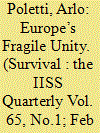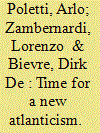| Srl | Item |
| 1 |
ID:
188803


|
|
|
|
|
| Summary/Abstract |
The EU is unlikely to develop the kinds of efficient collective responses to the Russia–Ukraine war that it produced in reaction to the COVID-19 pandemic. The conditions of strategic interdependence generated by the Ukraine crisis are more demanding than those triggered by the pandemic because its consequences are asymmetrically distributed across member states. Germany will find it difficult to play the role of regional stabiliser, anti-Europe parties could become stronger, new intra-European cleavages may arise over collective goals, and the expansion of the crisis’s time horizon could weaken prospects for effective collective action.
|
|
|
|
|
|
|
|
|
|
|
|
|
|
|
|
| 2 |
ID:
081219


|
|
|
|
|
| Publication |
2008.
|
| Summary/Abstract |
The European Union portrays itself as a different global actor. This self-representation has triggered a debate around the EU as a global 'normative power', while providing momentum for innovative research into how other societies view and assess the global performance of the EU. For the first time this article presents the findings of a study conducted respectively in Brazil, India and South Africa. As leading nations of the 'global South', these three countries offer important insights into how the EU is perceived not only in emerging markets, but also in the so-called developing world at large. The findings reveal that the EU is an unknown entity to most citizens in these countries and is rarely covered by local media. Moreover, it is often criticised for inconsistencies and double standards by political elites and civil society, especially in the area of international trade, while being praised as a successful example of regional integration.
|
|
|
|
|
|
|
|
|
|
|
|
|
|
|
|
| 3 |
ID:
191011


|
|
|
|
|
| Summary/Abstract |
There has been no shortage of critiques of the EU-China Comprehensive Agreement on Investment (CAI) signed on 30 December 2020. Many have perceived the CAI as a snub in the face of the Biden administration, which has the potential to jeopardise one of the most important strategic goals of the transatlantic alliance: setting aside four years of Trump’s populist economic policy and working in close coordination with a view to developing a united front to contain China. While the CAI does indeed indicate that the EU considers itself a fully autonomous international economic player, however, such a display of autonomy need not be incompatible with a stronger transatlantic alliance. In fact, the CAI may be an opportunity for the transatlantic alliance to evolve into a partnership among equals that is necessary to successfully navigate the uncharted waters of the coming global (dis)order.
|
|
|
|
|
|
|
|
|
|
|
|
|
|
|
|